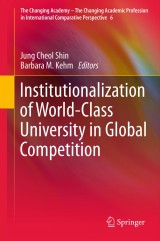Details

Institutionalization of World-Class University in Global Competition
The Changing Academy - The Changing Academic Profession in International Comparative Perspective, Band 6
|
96,29 € |
|
| Verlag: | Springer |
| Format: | |
| Veröffentl.: | 27.11.2012 |
| ISBN/EAN: | 9789400749757 |
| Sprache: | englisch |
| Anzahl Seiten: | 301 |
Dieses eBook enthält ein Wasserzeichen.
Beschreibungen
<p>Moving the academic debate on from its current focus on development to a more nuanced sociological perspective, this fresh research is a collaboration between academics in South Korea and Germany that assesses the factors shaping world-class universities as institutional social systems as well as national cultural treasures. The work explores in detail how WCUs have moved to a central position in policy circles, and how these often ambitious government policies on WCUs have been interpreted and adopted by university administrators and individual professors.</p><p><p>The authors provide a wealth of empirical data on universities, both world-class and aiming for WCU status, in a range of polities and continents. They compare strategies for developing WCUs in countries of the East and the West, both developing and developed. </p><p><p>Nations featured in the statistical purview include nine countries (Germany, France, Japan, South Korea, China, Taiwan, Malaysia, Singapore and Hong Kong SAR). The volume goes further than merely taking a snapshot of the current situation, offering detailed and considered strategies and rationales for institutionalizing and developing WCUs, particularly in Asian countries where Confucian cultural influences accord education the highest priority.</p><p>
<p>1. The World-class University in Different Systems and Contexts; J.C. Shin and B.M. Kehm.- <b>Part A. Background of WCU Worldwide</b>.- 2. The World-class University: Concept and Policy Initiatives; J. C. Shin.- 3. The Global Research and the ‘World-class’ Universities; W. Ma.- 4. World-class Universities: The Sector Requirements; S. Heyneman and J. Lee.- 5. Nation-states, Educational Traditions and the WCU Project; S. Marginson.- <b>Part B. WCUs in non-English Speaking Advanced Systems</b> .- 6. To Be or Not to Be? The Impacts of the Excellence Initiative on the German System of Higher Education; B.M. Kehm.- 7. Reconciling Republican ‘Egalité’ and Global Excellence Values in French Higher Education; L. Cremonini, P. Benneworth, F. Westerheijden and H. Dauncey.- 8. Challenges for Top Japanese Universities when Establishing a New Global Identity: Seeking a New Paradigm after “World Class”; A. Yonezawa.- <b>Part C. WCUs in non-English Speaking Developing Systems</b>.- 9. World-class University in Korea: Proactive Government, Responsive University, and Procrastinating Academics; J.C. Shin and Y.S. Jang.- 10. Building a World-class University in China; Y. Luo.- 11. The Challenges for Establishing World-class Universities in Taiwan; D. Chang.- <b>Part D. WCUs in English Speaking Developing Systems</b>.- 12. Malaysia’s World-class University Ambition: An Assessment; M. Sirat.- 13. Peering through the dust of construction: Singapore’s efforts to build WCUs; K.C. Ho.- 14. Frameworks for Creating Research Universities: The Hong Kong Case; G. Postiglione and J. Jung.- <b>Conclusion</b>.- 15. Universalizing the University in a World Society; F.O. Ramirez and J.W. Meyer.- 16. World-class University across Higher Education systems: Similarities, Differences, and Challenges; J.C. Shin and B.M. Kehm. - Index. </p>
<p>Moving the academic debate on from its current focus on development to a more nuanced sociological perspective, this fresh research is a collaboration between academics in Asia and Europe that assesses the factors shaping world-class universities as institutional social systems as well as national cultural treasures. The work explores in detail how WCUs have moved to a central position in policy circles, and how these often ambitious government policies on WCUs have been interpreted and adopted by university administrators and individual professors.</p><p><p>The authors provide a wealth of empirical data on universities, both world-class and aiming for WCU status, in a range of politics and continents. They compare strategies for developing WCUs in countries of the East and the West, both developing and developed. </p><p><p>Nations featured in the statistical purview include nine countries (Germany, France, Japan, South Korea, China, Taiwan, Malaysia, Singapore and Hong Kong SAR). The volume goes further than merely taking a snapshot of the current situation, offering detailed and considered strategies and rationales for institutionalizing and developing WCUs, particularly in Asian countries where Confucian cultural influences accord education the highest priority.</p><p>
Traces the ways in which world-class universities have been realized in differing national contexts Shows how governments have made WCU development a top political priority Analyzes the varying ways in which state policies on WCUs have been interpreted and adopted by university administrator and professors Sets out the results of a highly productive collaboration between leading researchers in higher education and sociology
Diese Produkte könnten Sie auch interessieren:

University Science and Mathematics Education in Transition

von: Ole Skovsmose, Paola Valero, Ole Ravn Christensen

96,29 €















